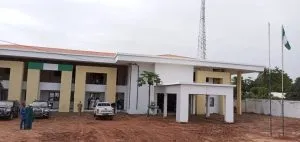The Permanent Secretary, Ministry of Foreign Affairs, Mr Gabriel Aduda has inaugurated a newly constructed Nigeria Chancery in Bissau.
Aduda stressed the need for improved bilateral relations between Nigeria and Guinea Bissau.
The News Agency of Nigeria (NAN)reports that the ceremony took place in Bissau on the sidelines of Nigeria’s 61st Independence anniversary.
Speaking at the event attended by diplomats and members of Nigeria community in Guinea Bissau, Aduda said bilateral relations between both countries span decades and had been through thick and tin, especially in the area of peace and security.
He said the Federal Government of Nigeria had shown very strong support for the government of Guinea Bissau at every point in time.
“We have enjoyed very cordial relations and it is as a result of this that we have taken it a step further to put in place this property.
“Often time it is not every mission that comes into a country that build a property like this, so this shows the importance and value that we attach to Guinea Bissau.
“As such, we are delighted not only that we are
commissioning this building but also that we are doing it on the occasion of our 61st Independence anniversary.
“By doing this, we are hoping that we will see improved bilateral relations politically, economically, consular matters and in trade between both countries.
“We want to see that the relation becomes stronger between the government of Nigeria, Guinea Bissau and our friends that are present,” he said.
Aduda said the building was carefully conceived to be able to cater for the needs of not just the embassy workers but Nigerians in Guinea Bissau.
He explained that in addition to the office spaces, the edifice housed modern restaurant and canteen as well as a 400-seat capacity multipurpose hall upon completion.
“The idea is to promote unity by making it open to Nigerian community to hold their meetings, weddings and other celebrations here under secured and safe environment.
“We will also be happy to share our space with other missions when the need arises and therefore, it has been strategically located for easy accessibility,” he said.
Aduda commended the Nigeria Ambassador to Guinea Bissau, Mr John Usanga for taking the initiative of moving to the new structure within a short time of assuming duty.
“I want to thank the Ambassador and his entire team in the mission because he could not have done it alone.
“The fact that he was able to take it to this level is commendable because he could have chosen to leave it like the other people before him, but he thought he needed a more befitting place .
“This is not only good for us as a country but will also save us the wastage that we are paying in the former Chancery.
“Even the environment is different and the work energy that it will bring will definitely be different because a work environment affects productivity,” he said.
The Ambassador said moving into the property had brought to a close all the unpleasant experiences the mission had experienced in a rented apartment.
He said the development would also resolve any doubt about Nigeria’s commitment to Guinea Bissau and the ECOWAS subregion as a whole.
“What we are witnessing today is not just the opening of a Chancery building but the marking of an epoch that will deepen Nigeria’s diplomatic relations with Guinea Bissau,” he said.
Usanga thanked the permanent secretary for taking time out of his busy schedule to come to Bissau for the inauguration.
NAN reports that the ceremony was attended by Mr Suzy Barbisa Minister of Foreign Affairs Guinea Bissau, Mr Ovido Pequeno and Mr Emmanuel Ohim, AU and ECOWAS representatives respectively in Guinea Bissau.
Mr Alexander Egorov, the Russian Ambassador to Guinea Bissau and the Dean of Diplomatic Corps in that country led other Ambassadors to the event. (NAN)

